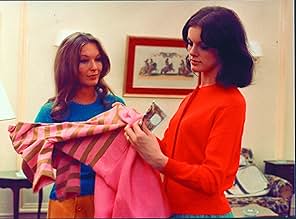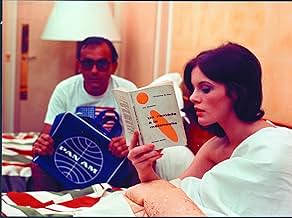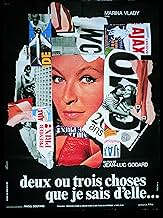अपनी भाषा में प्लॉट जोड़ेंA day in the life of a Parisian housewife/prostitute, interspersed with musings on the Vietnam War and other contemporary issues.A day in the life of a Parisian housewife/prostitute, interspersed with musings on the Vietnam War and other contemporary issues.A day in the life of a Parisian housewife/prostitute, interspersed with musings on the Vietnam War and other contemporary issues.
- निर्देशक
- लेखक
- स्टार
- पुरस्कार
- कुल 1 नामांकन
- Narrator
- (वॉइस)
- Young Man
- (बिना क्रेडिट के)
- Girl Talking to Robert
- (बिना क्रेडिट के)
- Girl in Bath
- (बिना क्रेडिट के)
- Christophe Jeanson
- (बिना क्रेडिट के)
- Meter Reader
- (बिना क्रेडिट के)
- Marianne
- (बिना क्रेडिट के)
- Monsieur Gehrard
- (बिना क्रेडिट के)
- Girl
- (बिना क्रेडिट के)
- Man in Basement
- (बिना क्रेडिट के)
- Author
- (बिना क्रेडिट के)
- Pécuchet
- (बिना क्रेडिट के)
- John Bogus
- (बिना क्रेडिट के)
- Woman in Basement
- (बिना क्रेडिट के)
- Bouvard
- (बिना क्रेडिट के)
- Robert Jeanson
- (बिना क्रेडिट के)
- Roger
- (बिना क्रेडिट के)
फ़ीचर्ड समीक्षाएं
There is little plot to the film, and instead Godard uses every film-making technique in his arsenal to take the audience on a journey through the Paris suburbs, having his characters delve into rambling monologues, often responding to questions or regurgitating lines fed through an ear-piece by Godard himself. The main focus is Juliette (Marina Vlady), who occasionally prostitutes herself so she can buy pretty clothes or perhaps just to relieve herself of the boredom of the consumerist lifestyle, while her husband Robert (Roger Monsoret) listens to speeches on the radio regarding America's involvement in Vietnam.
It's with his over-simplified characterisation of Juliette that 2 or 3 Things fails to hit the mark. She is beautiful and intelligent, but seems to only truly love shopping or catching the eye of a handsome man in a cafe. There's little of the free-spirited charisma that Karina embodied in her various roles under Godard, but perhaps that's the point. Themes are often explored with a remarkable lack of subtlety, with the director's obvious opposition to the illegal war in Vietnam cropping up many times throughout the film, with photographs of victims of the war spliced into a rather silly scene involving an 'American' photographer (with a heavy French accent) and his odd fetish with placing bags over ladies heads and having them act out a routine.
Far more impressive are the visuals, with the celebrated shot of a swirling espresso while Godard whispers about his own inadequacy being the most memorable image, and the sheer ambition of a project shot so quickly. Godard is both criticised and adorned for being simply too intellectual and obtuse for film, and 2 or 3 Things is one of the greatest examples of his unwillingness to craft a digestible film for his select audience. The dialogue is often wonderful and poetic, yet sometimes it's rambling nonsense, spoken by characters who have no place in the story, almost as if Godard got bored and moved his camera to a conversation he found more interesting. It's both frustrating and fascinating to see a director of such singular vision, and while there is little of the excitement and energy of his early New Wave work, 2 or 3 Things is an experience like no other.
That said; I feel people shouldn't be so quick to dismiss the film, as it features several scenes of bold technical invention, a sharp and biting wit and a real sense of both visual and thematic imagination. It is also a fairly worthy time capsule to the spirit and scope of Paris at this particular time, expressing many of the political fears and social concerns central to most free-thinking Parisians circa 1967. Whereas the two other Politically minded films that Godard produced in 1967 would broaden the thematic scope to create a much more pointed attack on armchair terrorists and bourgeois revolutionaries, "2 or 3 Things" works on a much smaller scale; choosing suburban Paris with its high-rise apartment buildings, shops and service stations as a backdrop that is continually dwarfed by the wheels of industry and industrial repair. At one point Godard says in voice over that "the landscape is like a face", all the while showing how it is continually destroyed, changed and re-developed in a series of repetitive visual metaphors open to a variety of thematic interpretations. Many viewers take these sequences at face value and choose to view the film as a simple, heavy-handed essay on the decline of industry and the rise of Capitalism and subsequently write the film off. However, even though the film takes a great deal of work and may indeed seem boring and heavy-handed, there are deeper themes and ideas that make this a slightly more rewarding work in the long run.
Once again, Godard anchors his ideas to the theme of prostitution; recalling elements of Vivre sa Vie (1962) whilst simultaneously foreshadowing certain issues later expressed in Sauve qui peut (la vie) (1980). Like the latter film, Godard implies that with an increasing focus on consumerism and the pursuit of material gain, society is prostituting itself. This is further elaborated upon by Godard's continual focus on product logos and brand names that are inter cut and often re-framed in order to create humorous puns that are probably lost on anyone not entirely familiar with the French language, as well as a final shot that renders the cityscape of suburban Paris as the ultimate consumer paradise. The idea of prostitution also extends to the main character, who here, prostitutes herself in order to break up the monotony of her everyday life, whilst also featuring as a somewhat controversial comment on acting itself (something that is further implied in the opening scene).
Like many of Godard's films, "2 or 3 Things" uses a great deal of humour to give the satire a more pointed attack. Much of this humour tends to go over the heads of most viewers, largely as a result of having to read the subtitles or simply missing out on much of Godard's clever use of wordplay and usually ironic puns. Scenes, such as the young boy relating his dream about the unification of North and South Vietnam, or the scene in which Juliet and her friend enact a bizarre, tongue-in-cheek sex game with a foreign war correspondent (who films them with a super 8 camera and looks a little like Godard himself), all the while cutting back and forth to shots of construction and cars entering a service station, being an incredibly bold and rebellious critique in itself. Other sections of the film seem more poetic; almost as if Godard is putting his thoughts on film as he goes along and creating something that is, on the one hand, entirely personal, whilst simultaneously being an obvious piece of satirical agitprop. The two strands don't always sit well together, and too often Godard's ideas seem strained and unformed; especially in comparison with those two other films from 1967, previously mentioned.
Obviously many viewers have had problems with the film, and really, your enjoyment of it will depend greatly on how much you trust Godard's instincts as both a satirist and filmmaker, and how willing you are to enter into a dialog with him on a subject that is now resigned to an incredibly brief footnote in 20th century history. For me, the film is undoubtedly one of his more difficult projects and not one that I would place higher than the likes of Le Mepris (1963), Pierrot le fou (1965) or Helas pour moi (1993), etc. However, the scope of Godard's ideas and his way of presenting them visually are close to genius, whilst the occasional moment of imaginative wit, visual poetry or the sheer verve of Godard's film-making abilities make the slow pace and poor performance from Marina Vlady all the more bearable. 2 or 3 Things I Know About Her is worth seeing in the context of both Week End and La Chinoise and is certainly worth experiencing as a double bill with the similarly themed Sauve qui peut (la vie).
I'm not a fan of the New Wave -- Truffaut, Demy, Malle and Rohmer occasionally excepted -- but this soon reveals itself as an exercise in the failings of modern society and the people within it. Everyone is disconnected from other human beings, everyone feels hopeless and is just going through the motions and no one tries to view anything as a more than a collection of unrelated attributes. It is possible, of course, that Godard has produced a satire of current French philosophy, with everyone well-dressed in the latest fashions, smoking American cigarettes and drinking Coca-Cola, and Raoul Levy showing up as "John Bogus, the American", wearing a t-shirt with an American flag and claiming to be a photo-journalist.
I do have an urge to smack every cast member, and that is why I think it may be a satire about hyper-intellectuals who are so wise they are miserable, so assured in their beliefs that they believe nothing, so brave in their solitude that they refuse to trust anyone.
But I think not.
However, "narrative" or gender politics are really not the point of "2 or 3 Things...". First off, "her" is less a person, but a city- Paris. And it is just not Paris, as in the city of romance and art, but De gaulle's radical transformation of Paris from a pre-war city of antiquity to a modern commercial center. The film is framed around extended shots of constructions sites, developing freeways, and cranes for a reason- to show how this ancient city is being radically transformed with or without the benefit of its citizens. In a way, this film is a meditation on a phenomena spreading around the world from the 1990's to the present (and especially the United States)- urban gentrification. In the push to modernize and beautify a city, the powers that be often step on the majority which make up a city- the lower and middle class. Godard's precise comments on urban planning are 40 years ahead of their time. If anything, "2 or 3 Things..." is far more relevant today than in 1967.
Secondly, the film is an agit-prop protest against crass commercialism and how it defaces and devoids the human experience. The 2 or 3 women in the film (Paris included) are so wrapped up in the base drive for material goods that they forget the very principles of humanity- love, caring for one's family, intellectual desire, and compassion. Godard's definition of consumerism robs a society of its metaphysical compassion and leads intellectual and personal freedom into a locked room. In the age of I-Pods and Paris Hilton, Godard's sharp criticism of crass consumerism is amazingly relevant. It is a wonder that the Adbusters/Culture jam movement have not latched onto this film with a passion.
"2 or 3 Things..." also serves as one of the many watermarks of Godard's highly productive and influential 1960's period- blending the emotions of Contempt or Vivre Sa Vie with the chic radicalism of La Chinoise or Week End. Godard was an artist in constant evolution in the 1960's and "2 or 3 Things..." is one of these many evolutionary steps.
Be forewarned, "2 or 3 Things..." is NOT a good starting point for those new to Godard. It is far too meditative, "slow", and didactic for one to get a true sense of Godard's radical style. I strongly recommend Masculine-Feminine, Contempt, Breathless, Band of Outsiders, or Week End as a better starting point for Godard. A newcomer to Godard's style might be forever turned off by the slow pacing of "2 or 3 Things...". However, after digesting a few of this great film maker's works, line up "2 or 3 Things...". A timeless and extremely relevant film.
क्या आपको पता है
- ट्रिवियाWhen Juliette drops off her daughter at the day care/brothel, there is a painting on the wall of a screen shot of Nana Kleinfrankenheim, portrayed by Anna Karina, in Vivre sa vie (1962).
- भाव
Narrator: Since social relations are always ambiguous, since my thoughts divide as much as unite, and my words unite by what they express and isolate by what they omit, since a wide gulf separates my subjective certainty of myself from the objective truth others have of me, since I constantly end up guilty, even though I feel innocent, since every event changes my daily life, since I always fail to communicate, to understand, to love and be loved, and every failure deepens my solitude, since - since - since I cannot escape the objectivity crushing me nor the subjectivity expelling me, since I cannot rise to a state of being nor collapse into nothingness - I have to listen, more than ever I have to look around me at the world, my fellow creature, my brother.
- कनेक्शनEdited into Notes pour Debussy - Lettre ouverte à Jean-Luc Godard (1988)
टॉप पसंद
- How long is 2 or 3 Things I Know About Her?Alexa द्वारा संचालित
विवरण
बॉक्स ऑफ़िस
- US और कनाडा में सकल
- $1,04,038
- US और कनाडा में पहले सप्ताह में कुल कमाई
- $11,214
- 19 नव॰ 2006
- दुनिया भर में सकल
- $1,04,038
- चलने की अवधि1 घंटा 27 मिनट
- ध्वनि मिश्रण
- पक्ष अनुपात
- 2.35 : 1
इस पेज में योगदान दें




























